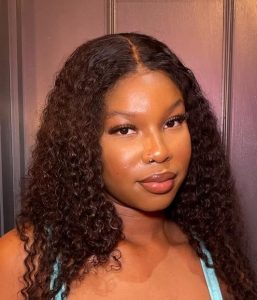Latilda Ajani is a second year medical student at Anglia Ruskin University (ARU), and Vice President of the university’s Widening Access to Medicine Society (WAMS), which supports students from communities who are under-represented in the profession. She kindly took the time to talk with us about her own experiences so far, some of the difficulties medical students are facing, and the importance of work around widening access.

Q: When did you decide that you wanted to study medicine?
From a young age, I knew I wanted to go into a profession that helps others. Over time, I realised that my strengths lay in the sciences, and I also have a passion for people. I have an inquisitive mind, and I like a challenge. Medicine felt like the perfect fit.
Q: How was your experience of applying to medical school?
It was complicated a lot by the Covid pandemic. The first time I applied, I was short of the required grades. But I really couldn’t see myself studying anything else. I got on the waiting list for a place at Plymouth, which I was banking on. Because of the pandemic, though, they didn’t use the waiting list that year. I decided to take a gap year and resit some exams, and by doing that, I got the required grades for a place at ARU.
Q: What were your first impressions of medical school?
It was difficult to come into such a demanding course after a year away from education. I found it fun at first, as it was so different from anything I’d done. But as time went on, I did find it quite overwhelming – very much an emotional rollercoaster. At times I thought, “oh my gosh, I can’t do this”.
At the start of my first year, all lectures were online. On top of trying to acclimatise to the uni experience, you also needed a lot of motivation every day to stay on top of your learning. It’s better now, as lectures are back in person and everything’s more face-to-face.
Q: When did you join WAMS?
I joined the society towards the end of my first year, because I wanted to make a difference – not just for people who are trying to get into medicine from backgrounds that are disadvantaged, but for students within the university too.
Our university’s WAMS scheme allows people that fit certain eligibility criteria to get interviews with reduced grade requirements, but that’s only part of it. I applied to the scheme even though I had the grades, because there’s other support too, like funding for essential supplies like lab coats and stethoscopes. It’s also about creating a sense of community. Knowing that there are other people who come from a similar background, feel a similar way to you, who you can talk to – it does help.
Some medical students have certain advantages. If you have parents or close friends who are doctors, you absorb some essential knowledge. (I didn’t know what a portfolio was until recently!)
Also, those who are very well-off don’t have to worry about certain things. Online answer banks, for example, which are really essential when preparing for exams – the subscriptions for those are not cheap. By providing some material support and a place to share knowledge, WAMS schemes can help level the playing field.
Q: Do you or your fellow students have to take on part time work?
Yes, though we’re encouraged not to take on more than 16-20 hours a week. Last year I didn’t, but this year, partly because of the cost of living crisis, it’s smarter for me to work. It means I don’t have to struggle, and I think in future I’ll have to continue working alongside studying. But it definitely takes a toll. As well as taking time away from your education, it puts you in a different headspace, and it can be hard to switch between the two.
Q: What would help make medical study more manageable?
Financial support, especially for fourth and fifth years, is really important, and it’s great that the RMBF can provide this. I know a fifth-year student who is working three jobs. When they told me that, I was so shocked. To do that alongside such a demanding, full-time degree: it’s easy to see why potential doctors can end up dropping out. Even those who qualify can already feel burnt out before they’ve even started working.
It’s such a shame. You come into medicine wanting to help people, to do this job and fulfil your passions, but by the end of it, you’re so drained by everything.
Q: What are the biggest issues affecting medical students at the moment?
Mental health, definitely. It is talked about more than it was before, but it’s still such a big issue. A lot of students suffer with various conditions, from anxiety and depression to ADHD. There should definitely be more support.
ARU does offer wellbeing and counselling services, which I have used, but it still feels frowned upon – you worry people are going to look at you differently. You even doubt yourself – am I competent enough to be a doctor, if I have this or that? I think there needs to be more work, across all medical schools, to fight that stigma.
Thanks so much to Latilda and the ARU WAMS team for spreading the word about the RMBF’s student suppport. Follow them on Instagram: @aruwams
